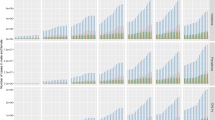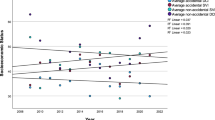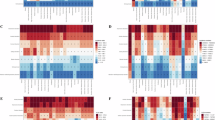Abstract
Background
Interpersonal violence (IV) is a common problem among adolescents and young adults and has long-term consequences for the health and development of youth.
Methods
Data on incidence and disability adjusted life years (DALYs) of IV (physical violence by firearm, by sharp object, sexual violence, and by other means) for adolescents and young adults aged 10–24 years in 204 countries and territories were retrieved from the GBD 2019. The age standardised rate (ASR) and estimated annual percentage change (EAPC) were used to analyze the global trends by sex, and SDI.
Results
Globally, in 2019, the age-standardised incidence rate (ASIR) of IV among adolescents and young adults was 566.0 per 100,000 person years. From 1990 to 2019, the IV incidence and the age-standardised DALYs rate of IV among adolescents and young adults decreased globally. At the regional level, the largest increases in ASIR of IV from 1990 to 2019 were observed in Oceania (0.94%), Caribbean (0.81%), and Southern Latin America (0.63%). A reversed V-shaped association was found between the SDI and the burden of IV at the regional level.
Conclusions
Unwavering efforts must be made to prevent IV among adolescents and young adults and care for victims of IV.
Impact
-
Although the burden of IV is decreasing worldwide from 1990 to 2019, the most significant increase was found in Oceania, the Caribbean, and Latin America.
-
High-income North America continues to be affected by physical violence by firearm, while East Asia continues to face issues with sexual violence.
-
Unwavering efforts must be made to prevent IV among adolescents and young adults and care for victims of IV, including clinical and mental health.
This is a preview of subscription content, access via your institution
Access options
Subscribe to this journal
Receive 14 print issues and online access
$259.00 per year
only $18.50 per issue
Buy this article
- Purchase on SpringerLink
- Instant access to full article PDF
Prices may be subject to local taxes which are calculated during checkout



Similar content being viewed by others
Data availability
The data used for the analyses in the study are publicly available at https://ghdx.healthdata.org/gbd-results-tool.
References
World Health Organization (WHO). Health for the world’s adolescents: a second chance in the second decade: summary. World Health Organization. 2014. https://apps.who.int/iris/handle/10665/112750. Accessed 10 May, 2023.
Bushman, B. J. et al. Youth violence: What we know and what we need to know. Am. Psychologist 71, 17–39 (2016).
Krug, E. G., Mercy, J. A., Dahlberg, L. L. & Zwi, A. B. The world report on violence and health. Lancet 360, 1083–1088 (2002).
United Nations Children’s Fund. Hidden in plain sight: a statistical analysis of violence against children. 2014. https://data.unicef.org/resources/hidden-in-plain-sight-a-statistical-analysis-of-violence-against-children/. Accessed 9 May, 2023.
World Health Organization. Youth violence, https://www.who.int/news-room/fact-sheets/detail/youth-violence. 2023. Accessed 10 May, 2023.
Buchanan, C. Gun violence, disability and recovery. Xlibris Corporation; 2014.
Norton, R. & Kobusingye, O. Injuries. N. Engl. J. Med. 368, 1723–1730 (2013).
Aboagye, R. G. et al. Interpersonal violence among in-school adolescents in sub-Saharan Africa: Assessing the prevalence and predictors from the Global School-based health survey. SSM Popul. health 16, 100929 (2021).
Oram, S., Boyce, N. & Howard, L. M. Mental health and violence: opportunities for change. Lancet Psychiatry 6, 558–559 (2019).
Nivette, A., Sutherland, A., Eisner, M. & Murray, J. Sex differences in adolescent physical aggression: Evidence from sixty-three low-and middle-income countries. Aggress. Behav. 45, 82–92 (2019).
Chowdhury, N. et al. Exploring community- and systemic-level gender-based violence in visible minority women across five countries from an intersectionality lens: protocol for a mixed-methods systematic review. BMJ Open 14, e077113 (2024).
Cislaghi, B., Weber, A. M., Gupta, G. R. & Darmstadt, G. L. Gender equality and global health: intersecting political challenges. J. Glob. Health 10, 010701 (2020).
Pellegrini, A. D. The roles of aggressive and affiliative behaviors in resource control: A behavioral ecological perspective. Dev. Rev. 28, 461–487 (2008).
Campbell, A. The evolutionary psychology of women’s aggression. Philos. Trans. R. Soc. B Biol. Sci. 368, 20130078 (2013).
Murray, J. & Atilola, O. Determinants of youth crime in low-income and middle-income countries. Lancet Child Adolesc. Health 4, 96–98 (2020).
Yount, K. M., Krause, K. H. & Miedema, S. S. Preventing gender-based violence victimization in adolescent girls in lower-income countries: systematic review of reviews. Soc. Sci. Med. 192, 1–13 (2017).
Global burden of 369 diseases and injuries in 204 countries and territories, 1990-2019: a systematic analysis for the Global Burden of Disease Study 2019. Lancet. 396, 1204–1222 (2020).
World Health Organization (WHO). Adolescent health. 2023. https://www.who.int/health-topics/adolescent-health#tab=tab_1. Accessed 11 May, 2023.
David-Ferdon, C., Simon, T. R. & Knuth, A. Preventing youth violence: opportunities for action. Atlanta, GA: National Center for Injury Prevention and Control, Centers for Disease Control and Prevention, 2014.
U.S. Centers for Disease Control and Prevention. Child Maltreatment Surveillance. 2008. https://www.cdc.gov/child-abuse-neglect/communication-resources/CM_Surveillance-a.pdf. Accessed 7 March, 2025.
Assault injuries definition of indicators. 2024. https://health.mo.gov/data/mica/CDP_MICA/AssaultProfileDefofIndicator.html. Accessed 7 March, 2025.
Global, regional, and national incidence, prevalence, and years lived with disability for 354 diseases and injuries for 195 countries and territories, 1990-2017: a systematic analysis for the Global Burden of Disease Study 2017. Lancet. 392, 1789–1858 (2018).
Wang, B. et al. Global, regional, and national burden and attributable risk factors of depressive disorders among older adults, 1990-2021. Int. Psychogeriatr. 100069 https://doi.org/10.1016/j.inpsyc.2025.100069 (2025). Online ahead of print.
Fu, L. et al. Global, regional, and national burden of HIV and other sexually transmitted infections in older adults aged 60-89 years from 1990 to 2019: results from the Global Burden of Disease Study 2019. Lancet Healthy Longev. 5, e17–e30 (2024).
Fu, L. et al. Burdens Attributable to Intimate Partner Violence in Women Aged 15 Years or Older - China, 1990-2019. China CDC Wkly 5, 347–352 (2023).
Atienzo, E. E., Kaltenthaler, E. & Baxter, S. K. Barriers and facilitators to the implementation of interventions to prevent youth violence in Latin America: a systematic review and qualitative evidence synthesis. Trauma Violence Abus. 19, 420–430 (2018).
Peetz, P. Youth violence in Central America: Discourses and policies. Youth Soc. 43, 1459–1498 (2011).
Manzanero, J. R. L. Youth in Latin America and the Caribbean in perspective: overview of the situation, challenges and promising interventions. Cienc. Saude Coletiva 26, 2565–2573 (2021).
Smith, B. J. et al. Intentional injury reported by young people in the Federated States of Micronesia, Kingdom of Tonga and Vanuatu. BMC Public Health 8, 145 (2008).
Denny, V. C., Cassese, J. S. & Jacobsen, K. H. Nonfatal injury incidence and risk factors among middle school students from four Polynesian countries: The Cook Islands, Niue, Samoa, and Tonga. Injury 47, 1135–1142 (2016).
International Organization for Migration. Latin America and the Caribbean - World Migration Report. 2024. https://worldmigrationreport.iom.int/what-we-do/world-migration-report-2024-chapter-3/latin-america-and-caribbean. Accessed 7 March, 2025.
Tenenbaum Ewig, G. & Alvarado, A. Youth Violence in Latin America (Oxford Research Encyclopedias, 2020).
UNICEF. Children on the move and those affected by armed violence in Latin America appeal. 2025. https://www.unicef.org/appeals/children-on-the-move-in-latin-america. Accessed 7 March, 2025.
United Nations Development Programme. Climate-related security risks and violent crime in Caribbean “frontier” coastal communities: issues, challenges and policy options. 2020. https://www.undp.org/sites/g/files/zskgke326/files/migration/oslo_governance_centre/d8dca416c204cc6fdbe409ce38b45533a2b454e6657bca1a6368daefa5f5d96b.pdf. Accessed 7 March, 2025.
UNICEF. Stronger hurricanes are devastating communities, uprooting lives and putting children and their families at risk. 2020. https://www.unicef.org/child-alert/children-uprooted-caribbean. Accessed 7 March, 2025.
Gentle-Genitty, C. et al. Comprehensive assessment of youth violence in five Caribbean countries: Gender and age differences. J. Hum. Behav. Soc. Environ. 27, 745–759 (2017).
Bott, S., Guedes, A., Goodwin, M. M. & Mendoza, J. A. Violence against women in Latin America and the Caribbean: A comparative analysis of population-based data from 12 countries. (Pan American Health Organization, ISBN: 978-92-75-11718-7). 2012.
Stewart, D. E. et al. Latin American and Caribbean countries’ baseline clinical and policy guidelines for responding to intimate partner violence and sexual violence against women. BMC public health 15, 665 (2015).
United Nations International Children’s Emergency Fund. Child marriage and early unions in Latin America and the Caribbean. 2023. https://www.unicef.org/lac/en/child-marriage-and-early-unions-in-latin-america-and-the-caribbean. Accessed 12 May, 2023.
Girls Not Brides. Latin America and Caribbean. 2023. https://www.girlsnotbrides.org/learning-resources/child-marriage-atlas/regions-and-countries/latin-america-and-caribbean/?country=brazil. Accessed 12 May, 2023.
Roberts, G. Masculinity, mental health and Violence in Papua New Guinea, Vanuatu, Fiji and Kiribati. Pac. Health Dialog 14, 35–41 (2007).
Jose Sousa-Santos. Drug trafficking in the Pacific Islands: the impact of transnational crime. 2022. https://www.lowyinstitute.org/publications/drug-trafficking-pacific-islands-impact-transnational-crime. Accessed 12 May, 2023.
van Daalen, K. R. et al. Extreme events and gender-based violence: a mixed-methods systematic review. Lancet Planet. Health 6, e504–e523 (2022).
World Health Organization (WHO). Preventing youth violence: an overview of the evidence. 2015. https://www.who.int/publications/i/item/preventing-youth-violence-an-overview-of-the-evidence. Accessed 12 May, 2023.
Salas-Wright, C. P. et al. Trends in Fighting and Violence Among Adolescents in the United States, 2002-2014. Am. J. Public Health 107, 977–982 (2017).
Center for Disease Control and Prevention (CDC). Preventing youth violence. 2023. https://www.cdc.gov/violenceprevention/youthviolence/fastfact.html. Accessed 12 May, 2023.
The Lancet Child Adolescent H. #NeverAgain: gun violence and youth activism in America. Lancet Child Adolescent Health 2, 229 (2018).
Chapman, S., Alpers, P., Agho, K. & Jones, M. Australia’s 1996 gun law reforms: faster falls in firearm deaths, firearm suicides, and a decade without mass shootings. Inj. Prev. 21, 355–362 (2015).
YOUTH GVA. Gun Violence: US vs Japan. 2024. https://www.youthgva.com/gun-violence-us-vs-japan.html. Accessed 7 March, 2025.
Shi, X. & Zheng, Y. Sexual victimization in adulthood and associated factors among men and women: cross-sectional evidence from Mainland China. Arch. Sex. Behav. 51, 1001–1017 (2022).
Song, Y., Ji, C. Y. & Agardh, A. Sexual coercion and health-risk behaviors among urban Chinese high school students. Glob. Health Action 7, 24418 (2014).
Chan, K. L. Gender symmetry in the self-reporting of intimate partner violence. J. Interpers. Violence 27, 263–286 (2012).
Zhang, X. D. et al. Prevalence and correlates of sexual and gender-based violence against Chinese adolescent women who are involved in commercial sex: a cross-sectional study. BMJ Open 6, e013409 (2016).
Hillis, S., Mercy, J., Amobi, A. & Kress, H. Global prevalence of past-year violence against children: a systematic review and minimum estimates. Pediatrics 137, e20154079 (2016).
Devries, K. et al. Violence against children in Latin America and the Caribbean: what do available data reveal about prevalence and perpetrators? Rev. Panam. Salud Publica 43, e66 (2019).
Youth in action. https://youthinactionri.org/ 2025. Accessed 7 March, 2025.
Hureau, D. M. et al. Exposure to gun violence among the population of Chicago community violence interventionists. Sci. Adv. 8, eabq7027 (2022).
Acknowledgements
The authors gratefully acknowledge the Institute for Health Metrics and Evaluation (Washington University), the GBD Collaborators and all staff who have contributed in sharing their data needed for this study.
Funding
H.Z. is supported by the Natural Science Foundation of China Excellent Young Scientists Fund [82022064], Natural Science Foundation of China International/Regional Research Collaboration Project [72061137001]. All funding parties did not have any role in the design of the study or in the explanation of the data.
Author information
Authors and Affiliations
Contributions
H.Z. conceived the study and designed the protocol with L.F. L.F., T.T., and W.Z. performed analyses of the Global Burden of Disease data. L.F. and T.T. contributed to statistical analysis and interpretation of data. L.F., K.L., T.T., and H.Z. drafted the manuscript with all authors critically revising the manuscript.
Corresponding author
Ethics declarations
Competing interests
The authors declare no competing interests.
Additional information
Publisher’s note Springer Nature remains neutral with regard to jurisdictional claims in published maps and institutional affiliations.
Supplementary information
Rights and permissions
Springer Nature or its licensor (e.g. a society or other partner) holds exclusive rights to this article under a publishing agreement with the author(s) or other rightsholder(s); author self-archiving of the accepted manuscript version of this article is solely governed by the terms of such publishing agreement and applicable law.
About this article
Cite this article
Fu, L., Liu, K., Wang, B. et al. Burdens of interpersonal violence in adolescents and young adults. Pediatr Res (2025). https://doi.org/10.1038/s41390-025-04114-w
Received:
Revised:
Accepted:
Published:
DOI: https://doi.org/10.1038/s41390-025-04114-w



